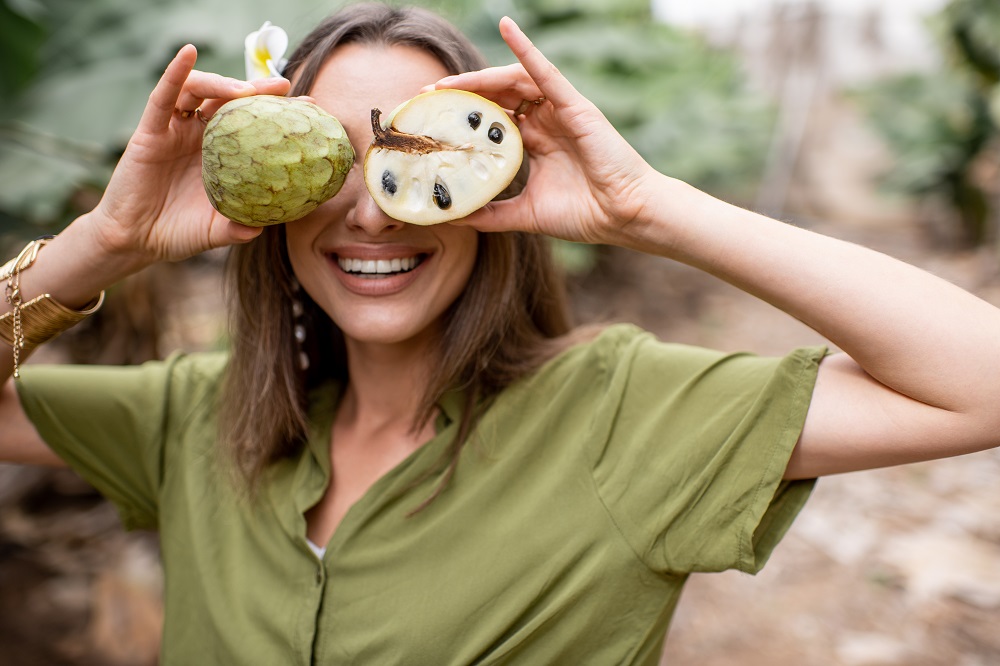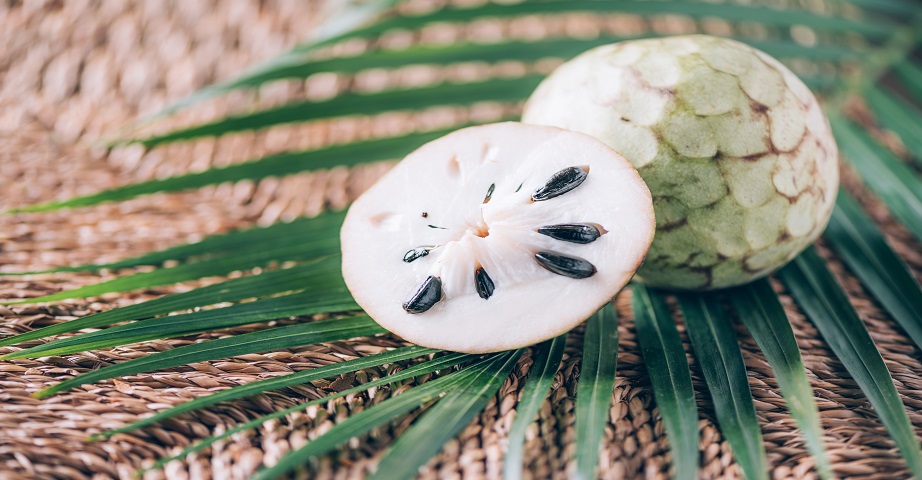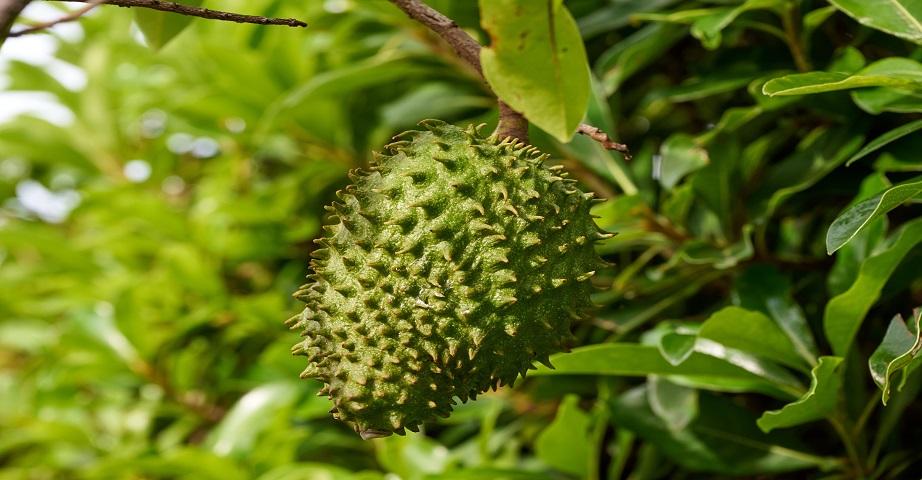Soursop - a tropical plant with health-promoting properties

Soursop is an evergreen plant that, although it has been used for years in natural medicine, among others in South America, is not very popular in Poland. Different parts of the plant are commonly used in tropical countries, but soursop fruits are most often used.
The soursop is distinguished not only by its taste, but also by its pro-health properties - the plant can be helpful among diabetics, as well as among people struggling with hypertension. In addition, the guanabana can have anti-inflammatory and antimicrobial effects. What other properties can soursop exhibit? How to apply it? Is guanabana available in Poland?
Soursop - what is it?
Soursop (from lat. Annona muricata) is an evergreen tree belonging to the Annonaceae family, which can reach 5-7 meters in height. It is a plant from the Antilles, which can be found in countries with a tropical climate - most often it grows in South America, among others Brazil or Colombia, and Central America, for example, Mexico, but sometimes also occurs in Australia or some regions of Asia.
The soursop has stately, dark green leaves that take a cordate shape. It is a plant that blooms all year round, and its flowers are distinguished by small size and yellow colouration. Soursop fruits take a conical shape. Immature ones are dark green, and over time they take on a light yellow colour. The skin of the fruit, due to the content of bitter substances, is an inedible part and is covered with small thorns. The flesh of guanabana has a white color, and its consistency resembles creamy pudding. Inside the fruit can be also found numerous black seeds, and the characteristic, unique taste of the soursop depends on the variety of the fruit - some types resemble more the aroma of strawberry and pineapple, while others a combination of banana, coconut and citrus.
The soursop can be found in different regions of the world under different names. In Spanish-speaking countries it is known as guanabana, while in Brazil it is called guyabano. Sometimes you can meet the name soursop, while in Polish the Annona muricata is often referred to as "flaszowiec miękkociernisty".
Soursop - nutritional values and composition of the fruit
The soursop is a juicy fruit - over 80% of the Annona muricata is water. In the guanabana can be also found carbohydrates, small amounts of protein and fat, as well as a large dose of vitamins and minerals - the plant contains primarily B vitamins (among others, folic acid) and vitamin C, as well as potassium, iron, phosphorus, calcium and magnesium.
Among the fresh soursop fruits, can be also found sesquiterpenes, which may have antioxidant effects and phenolic compounds, carotenoids and quercetin, which are substances with antioxidant properties.
Soursop properties
The soursop has been used for years in natural medicine among the South American and African populations. In folk culture, all parts of the plant are appreciated. The Annona muricata is attributed to the analgesic effect during neuralgia, as well as during the occurrence of joint-related ailments. The plant is also used among nursing women to stimulate milk production. The fruit soursop pulp is used during diarrhea and during rashes, while the leaves of the plant are used to help during insomnia and migraine, as well as while urinary tract infections. In traditional South American medicine, crushed seeds of the plant are used as an antiparasitic agent, and the bark, roots and leaves of the soursop are used for calming and lowering blood pressure.
What do modern clinical studies say about this?
Current data suggest that the Annona muricata might exhibit antimicrobial, as well as anti-ulcer and wound healing-accelerating properties. In addition, the results of in vitro studies, focusing on enzymes involved in the diabetic management of the body, such as alpha-amylase or alpha-glucosidase, suggest that the soursop fruit extract may have inhibitory properties of these enzymes and may also increase glucose tolerance and glucose uptake by peripheral tissues. In addition, the plant can protect the beta-pancreas cells, which are responsible for the secretion of insulin, which is a hormone that contributes to lowering blood sugar. Thus, the results of the analysis indicate that the extract from the soursop fruit may be helpful in the treatment of type II diabetes.
The researchers also concluded that the guanabana may have antihypertensive effects - the soursop extract may inhibit the activity of ACE, that is a key enzyme in the development of hypertension. Studies conducted on people, who struggled with hypertension, consumed the soursop juice showed, that the fruit can have a beneficial effect on health, contributing to the reduction of both systolic pressure, and diastolic blood.
In addition, the compounds contained in the soursop may have hepatoprotective properties, protecting the liver, and may also have anti-inflammatory and antioxidant properties, contributing to the neutralization of free radicals and reducing oxidative stress, and thus, they can delay the aging process.
There are also studies suggesting that the soursop leaf extract may inhibit the influx of lipids into the liver and adipogenesis in fatty tissues, and thus may be helpful in preventing obesity. However, further analysis is needed to confirm the beneficial effects of the plant in this area.

The use of soursop - how to eat guanabana?
The fresh soursop fruit is widely used in tropical countries where the plant can be found in the natural environment. Then the guanabana is used for the production of ice cream or sorbets, as well as fruit salads, jams and drinks, although it is also often eaten raw. Interestingly, the immature soursop is also often used as a soup ingredient.
In Cuba, a drink called "champola" is prepared from the fruit of the plant, which, in addition to the soursop, also contains cane sugar and milk, in turn in Indonesia, the guanabana is cooked with added sugar and made with "dodol sirsak", or sweet jelly beans.
In Poland and Europe, the fresh Annona muricata is difficult to come by. However, on the market can be found products containing the guanabana, such as the soursop juice, as well as pulp from the fruit of the plant and dietary supplements rich in the guanabana extract, which are available in the form of tablets, capsules or powder.
Thanks to their anti-inflammatory and antimicrobial properties, the soursop preparations are becoming more and more popular and are more and more often chosen by supporters of natural medicine, however, the use of the Annona muricata is also encouraged by its unique taste and wide application.
How long to use the Annona muricata?
Currently, it has not been estimated how long the soursop should be used to observe the benefits of including the plant in the daily diet. Some scientific studies suggest that the guanabana may have a beneficial effect on the human body only after about 12 weeks of use. However, it is widely recognized that the Annona muricata should not be used for too long, because there is a lack of detailed scientific research focusing on the impact of the plant on the human body.
Where can buy the soursop in Poland?
Preparations containing extracts of the Annona muricata or the soursop juice can be found primarily in health food stores or organic products. A dietary supplement containing the guanabana is a product, usually available in a pharmacy or herbal stores. The fresh fruit can be found on shelves in supermarkets and large discount stores, but it is worth remembering that the guanabana is a plant rarely found in European countries.

Soursop - contraindications and side effects
When using preparations or juice containing the soursop, should be always follow the dose recommended by the manufacturer, because the Annona muricata consumed in excess can have a negative impact on the human body.
Despite the wealth of valuable ingredients, in the guanabana can be also found substances such as swainsonins, which can disturb the work of the whole system. Scientific data also indicate that the soursop in excessive amounts may have neurotoxic effects.
The use of too high doses of dietary supplements with this ingredient may also be associated with side effects such as vomiting, nausea or diarrhea, as well as headaches.
Caution when using the soursop should be maintained by people struggling with hypertension, as well as diabetics taking medications, since the guanabana may increase the effect of pharmaceuticals.

